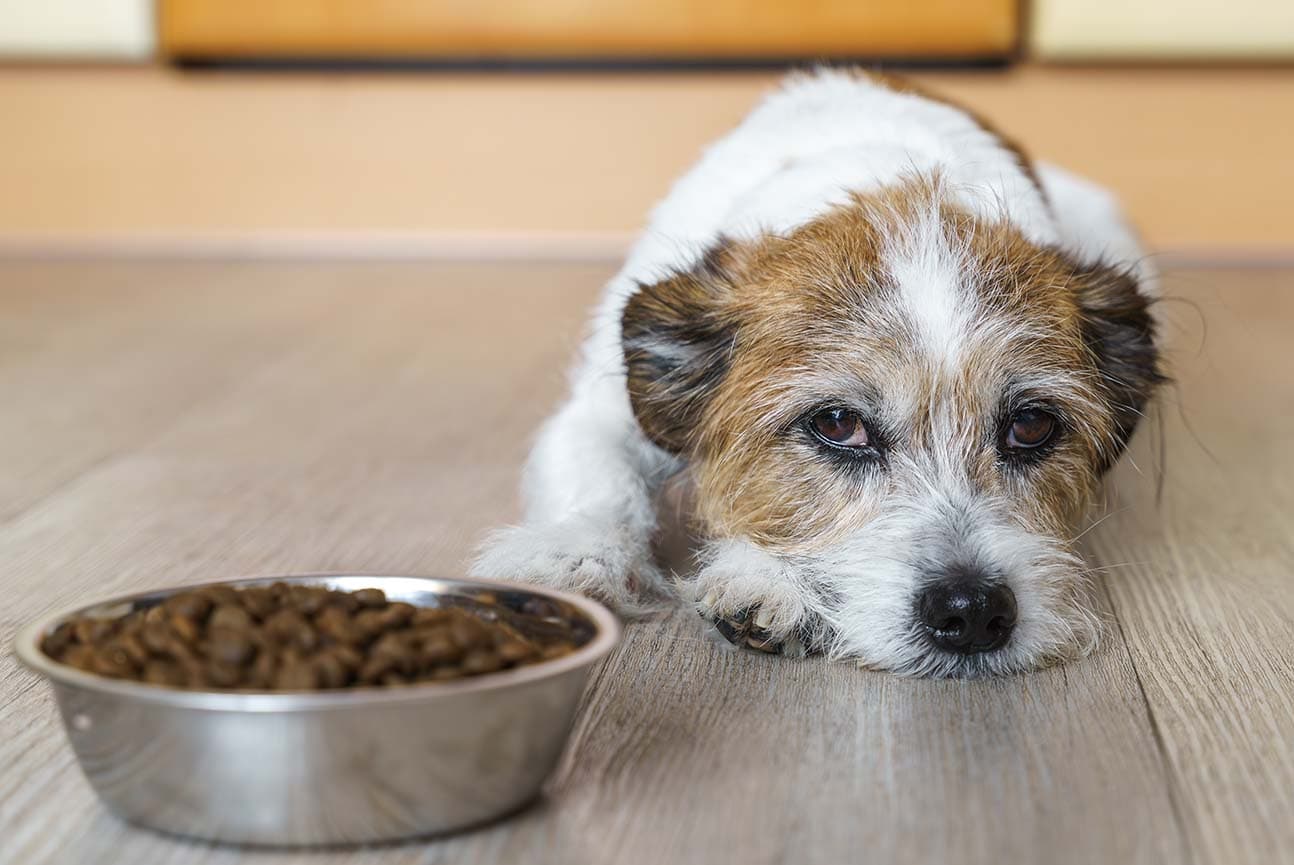Reviewed by Dr. Marta Gambarin
Updated on 22/10/2025
Reading time 4 min.
Overview
Severity: Low
Life stage: All
When your dog suddenly turns away from their favourite meal or shows little interest in food, it can be deeply concerning. Poor appetite in dogs, medically known as inappetence or anorexia, is one of the most common reasons pet owners seek veterinary advice. It can be completely normal, or it can be a sign of many different things, from a simple upset stomach to a more serious underlying health issue. This guide helps you understand what’s happening, how to help your furry family member, and when to seek professional care.
What to Do if Your Dog Has Poor Appetite
If your dog has skipped a meal or two but seems otherwise normal, there are a few simple things you can try at home. These tips can be particularly helpful for dogs in Dubai who might be feeling the heat or a bit out of sorts from a change in their daily schedule.
- Offer fresh, appetising food. Check the food’s expiry date and ensure it’s been stored correctly, especially in Dubai’s warm climate. Food can go off faster than you think. Try warming up wet food slightly to enhance its aroma, or add a small amount of low-sodium chicken or beef broth (make sure there’s no onion or garlic!). A tiny amount of plain, cooked chicken can also be tempting.
- Check their routine and environment. Have there been any recent changes in your household? A new pet, a change in your work schedule, or even the summer heat impacting their walk times can cause stress. Try to maintain a consistent feeding schedule and provide a quiet, comfortable space for them to eat, away from other pets or distractions.
- Ensure fresh water is always available. Dehydration can quickly become a problem, especially in Dubai’s climate. Make sure your dog has access to fresh, cool water at all times. You can add ice cubes to their bowl to keep it cool.
- Don’t force your dog to eat. This can create a negative association with mealtime and make the problem worse. Instead, offer them food, and if they don’t eat it within about 15-20 minutes, take the bowl away and try again at the next scheduled meal.
- Contact a veterinarian immediately if your dog hasn’t eaten for 24-48 hours. Don’t wait if you notice multiple symptoms or if your instinct tells you something isn’t right.
Common causes of poor appetite in dogs
Poor appetite is a symptom, not a disease itself. It may be a signal that something isn’t right. The causes can range from minor to very serious, which is why it’s so important to be observant. Some of the most common causes for poor appetite in dogs in Dubai are:
- Heat stress: Dubai’s high temperatures can reduce appetite, especially in flat-faced breeds like Pugs and Bulldogs.
- Gastrointestinal problems like upset tummy, constipation, pancreatitis, inflammatory bowel disease, or intestinal obstructions.
- Dental problems: Painful teeth, gum disease, or mouth injuries can make eating uncomfortable or impossible. This is particularly common in older dogs or those who haven’t received regular dental care.
- Illness: Kidney disease, liver problems, heart conditions, diabetes, and cancer can all cause appetite loss.
- Viral, bacterial, or parasitic infections can reduce appetite while the body fights them off.
- Stress, anxiety, loss of a companion or major life changes can impact mood and appetite.
- Medication side effects.
When to worry about your dog’s appetite
Emergency signs – seek Immediate Veterinary Care
Contact an emergency vet immediately if your dog shows any of these symptoms alongside poor appetite:
- Vomiting or retching repeatedly
- Signs of severe abdominal pain (hunched posture, reluctance to move)
- Pale or blue gums
- Extreme lethargy or collapse
- Difficulty breathing
- Signs of bloat (distended abdomen, unproductive retching)
Urgent concerns – contact your vet as soon as possible
- No food intake for more than 48 hours
- Complete loss of appetite, combined with not drinking water
- Significant behaviour changes
- Fever or signs of pain
- Your dog is diabetic or has another chronic illness
- Unexplained weight loss
Prevention of appetite problems
While not all causes of poor appetite are preventable, you can take steps to maintain your dog’s overall health and reduce risk.
- Ensure your dog has access to cool, shaded areas throughout the day. Consider adjusting feeding times to cooler parts of the day (early morning or evening) during summer months.
- In Dubai’s heat, dry food can become rancid quickly, and wet food spoils rapidly. Store food in cool, dry places and never leave food out for extended periods.
- Maintain multiple water sources and consider adding water to dry food to increase moisture intake and palatability.
- Annual veterinary examinations can catch health issues before they affect appetite. Senior dogs may benefit from bi-annual check-ups.
- Regular dental assessments and at-home dental care can prevent painful dental disease that affects eating.\
- Feed a high-quality, balanced diet appropriate for your dog’s age, size, and breed.
- Maintain regular feeding times and locations.
- Perform regular deworming and flea/tick prevention as recommended by your veterinarian.
Home treatment for poor appetite
- Warm food gently, or add water, plain chicken broth, or a dog-safe electrolyte solution to stimulate appetite
- Try hand-feeding or offering small, frequent meals
- Create a calm, comfortable feeding environment away from other pets or distractions
- If your dog hasn’t eaten anything for more than 48 hours, or if the appetite isn’t improving after 24 hours, professional veterinary care is essential.
Veterinary treatment options
Specific treatment depends on the underlying cause of appetite loss. Symptomatic treatment may include:
- Fluid therapy to address dehydration, particularly important in Dubai’s climate
- If nausea is contributing to appetite loss, antiemetic medications can provide relief
- Medications that can help stimulate appetite while the underlying causes are investigated
- Appropriate pain relief if dental disease or other painful conditions are suspected or identified
- Identifying the condition that is causing the loss of appetite is essential
- In severe cases, feeding tubes may be necessary to ensure adequate nutrition whilst underlying problems are resolved
Risk factors for poor appetite
Dogs more prone to appetite issues include:
- Senior dogs, as ageing affects digestion and taste
- Flat-faced breeds: more sensitive to heat stress
- Dogs with chronic illness
- Small breeds: more likely to be picky eaters
- Dogs with dental problems
- Dogs with a sensitive stomach or a history of pancreatitis
Concerned about your pet’s symptoms?
If your dog is off their food and you’re worried, the best thing you can do is seek professional advice. Book a check-up or emergency appointment today at Modern Vet Hospital in Dubai. Their skilled staff provides diagnostic services, emergency treatment, and continuing care appropriate to your dog’s condition. From regular check-ups to emergency care, Modern Vet Hospital is your primary veterinary clinic in Dubai for thorough, empathetic pet care.
Share this, choose your platform!
Reviewed by
Dr. Marta Gambarin
DVM
Dr. Marta was born and grew up in the beautiful city of Milan in Italy. It was at only three years old when she broke the news to her parents; she would one day become a vet and not once has she had second thoughts or cold feet about it. Dr. Marta was set and her mind was completely made up. She always had a deep connection with animals, sometimes better than with humans as she tends to find peace when around them.


